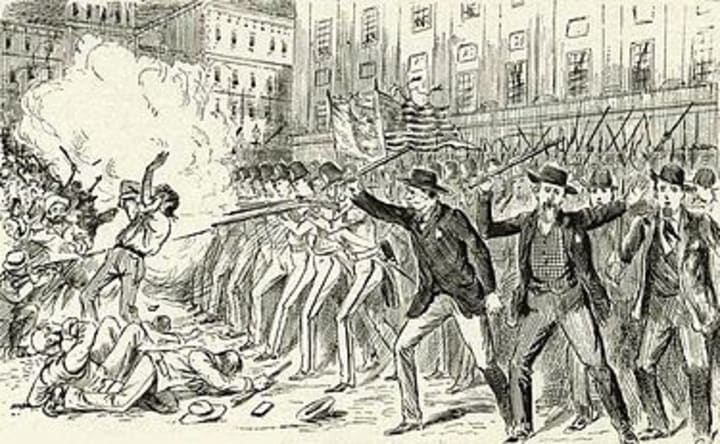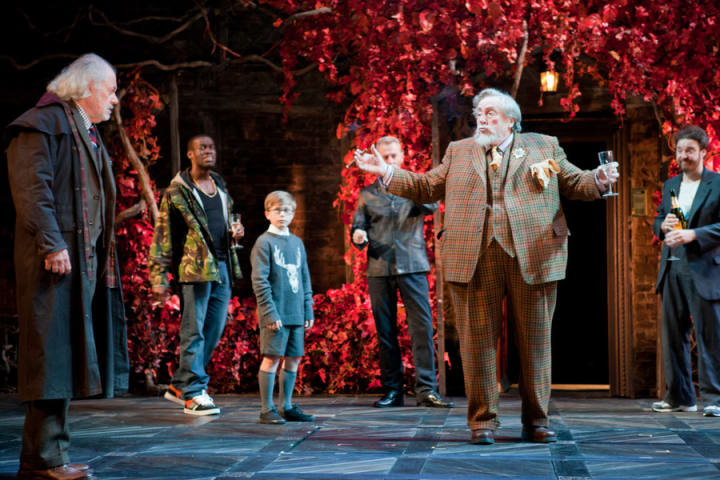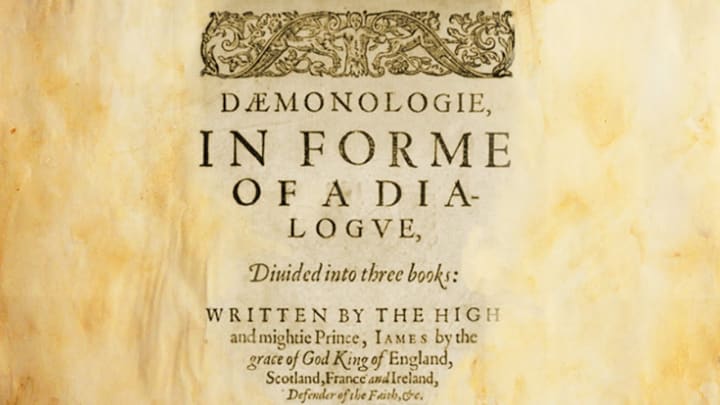Debunking The Curse of 'Macbeth'
By the pricking of my thumbs, something easily explainable this way comes

Everyone knows that 'Macbeth' is cursed, right?
It's common knowledge - certainly in theatrical circles - that even saying the name of Shakespeare's masterpiece is bad luck. Instead, actors and directors call it 'The Scottish Play.' And if you say the 'M' word whilst you're actually in a theater, then - to alleviate the curse - you have go outside, turn around three times, and then spit on the floor. If you don't... well, let's just say you weren’t warned.
It's one of the theater's most enduring legends. 'The Curse of Mac... The Scottish Play.'
But why is the play cursed? After all, it's a pretty straight-forward piece.
A battle-hardened Scottish soldier meets some witches (who might be real, or could just be a figment of his unstable mind), and they - along with his unhinged wife - encourage him to murder his way to the throne. Which he does. Then, racked with guilt, he and wife - not the most stable couple at the outset - go even more mad. There's a battle, lots of characters die (including the psychotic ruler and his likewise psychotic wife), and a non-murderous, and a lot more sane, man becomes king. The end.
So, why is this two-hour long exploration of ambition, sorcery, madness, and evil so blighted with misfortune?
It's Shakespeare's fault, really. You see, William - that keen observer of human nature - cheated a bit when it came to writing the characters of the all-important Witches in the play. Especially with regard to the spells they utter. For he didn't just invent the spells: He actually copied them off some real-life witches he'd met (as you do).
And, peeved at the Bard for revealing their trade secrets, they cursed the play for eternity. From that point on, misfortune shall befall every production as the witches enact their supernatural revenge.
It's a great story. A fantastic legend. Well-known and enduring.
What's less known is that it's all made up.
As in completely not true.
Max's Little Lie
In the 19th century, 'Macbeth' was a hugely popular play in England. It was being staged everywhere, all of the time. So much so, that everyone began to get a bit bored of it.
And, when people get bored of something, they take the pi... they begin to make fun of it. One of the people who did was the critic (and all-round cheeky-chap), Max Beerbohm. Why he actually did this is an utter mystery, but he invented a story that the actor who played Lady Macbeth in the very first production had died in mysterious circumstances.
They hadn't.
However, the story took hold, and - in no time at all - everyone believed it. If that seems inconceivable, then just consider how quickly, and easily, 'fake news' mutates into the 'truth' in our modern age; the Victorians could be just as gullible as we are.
Also, although 'Macbeth' might have been falling out of favor, Shakespeare himself wasn't. This was the era of the Empire, and a time when everything that represented the best of British was lauded, and worshiped. As our national writer, it was inevitable Shakespeare would be the centerpiece of this celebration of everything that was good about this 'sceptred isle.'
There was a renewed scholarly interest in the Bard, and the age of 'bardolatry' was born.
Critics, and academics were not only falling over themselves to praise Shakespeare, they were also attempting to outdo each other by trying to find new things to say. We are still indebted to much of what was discovered during this time; some of which not only influences how we see the plays today, it also laid the path for Shakespeare's cultural dominance in the twentieth century.
However, there was also a lot of rubbish said, and written. Much of it was over-earnest; some just silly, and aimed to poke fun not so much at the playwright himself, but the army of ultra-serious devotees that suddenly sprung up to praise him. And, given that 'Macbeth' was being done to death, it became the ideal vehicle for satire.
And that's where Max Beerbohm enters the scene.
But, around the same time as Beerbohm was weaving his fantasy, the well-known English actor, William Macready, was touring America with his production of 'Macbeth.' Whereas theater audiences in England were bored of 'The Scottish Play', it seems our cousins from across the Pond couldn't get enough of it.
Macready's great rival was the American actor, Edwin Forrest, who just happened to be starring in his own version of the play at the very same time. Now, this is where it all gets very bizarre, so try and stay with me.
When Macready performed his Thane at the Astor Opera House in New York, Forrest's supporters showed up, looking for trouble. When Macready went onstage, riots broke out.
Riots. In a theater. Because of a play. (Told you it got bizarre.)
In the bedlam that followed, soldiers (who'd been summoned from a nearby barracks in case things got too rowdy) fired into the crowd. Over twenty people were killed.

Look - it's the curse!! It's damned, I tell you!!
No, it's not. The Astor Opera House riots occurred because two egomaniac actors whipped up a frenzy (which they did because they both understood Cardinal Rule Number One of Show-business: 'Notoriety never hurts ticket sales'), because it fostered a false rivalry which resulted in more people going to see their boring, stodgy shows. And then, instead of dealing with the mob effectively, the army basically shot them.
And then everyone blamed a curse for what happened.
A curse that didn't even exist, because it was the fantasy of a bored, naughty critic.
One that makes even less sense if you ignore the whole 'bardolatry' angle, and go back in history to consider the man who actually wrote the play itself.
The Lazy, Money-making, Genius Son of Stratford
The central argument for the curse is that Shakespeare stole real witches spells, verbatim.
Now, on the one hand, this ISN'T beyond the realms of impossibility. There were many people in Jacobean London who didn't believe in modern medicine (or what doubled as modern medicine back then, anyway), and they may have had some, let's say, peculiar ideas about treatment. It's not absurd to suggest that William may have encountered someone with a predilection towards the more unorthodox. Maybe even something magic-related.
Could have happened.
But probably didn't.
For this was a time when simply being the 'wrong' denomination of the Christian faith could mean death. As for witches? If finding someone who admitted to being a Catholic was hard enough, witches were hardly going to be gallivanting around in full public view. Not least as people who were accused of such a lifestyle were being hung, drowned, and burnt all across Europe.
If a mere playwright had managed to track down a coven, then he showed more investigative prowess than the many witch-finders did.
But, there's a bigger issue here.
Now, I adore Shakespeare. Greatest writer who ever lived, no argument. However, he was a playwright, not a journalist. Verisimilitude and accuracy weren't his abiding traits. This is a man who gave landlocked countries coasts if it suited the play. The idea that he inserted 'real' spells into one of his plays when he couldn't even be bothered to find out if his settings had shorelines is stretching things.
However, there's an even bigger issue.
Shakespeare, in addition to being the greatest wordsmith who ever lived, was also one of the greediest. He loved money. And, as he was a share-holder in the theater where his plays were staged, the more tickets they sold, the more money he got. So, he wrote plays that would attract the biggest audiences.
For example, audiences loved the Falstaff character from the Henry IV series. Loved him. And I can see why. He's funny, but also tragic. However, he's also a supporting character in a largely very serious sequence of plays. But, Shakespeare didn't become rich by not giving the audience what they wanted.
So, visualizing the size of the box office, he then wrote a comedy - a comedy - where Falstaff is the main character. 'The Merry Wives of Windsor' is hard-going, but it made Shakespeare a lot of cash. (It also turned the once-interesting character of Sir John Falstaff into a one-note, comic buffoon who behaved if he had been cut and paste straight from the script of low-budget, 1970's sex-comedy).

But it wasn't just audiences Shakespeare pandered to; he wasn't adverse to currying the favor of those slightly higher up the social ladder. Even the monarch.
And England had a new one, James.
Who happened to be Scottish.
Who also just happened to be obsessed with the occult. With witches, in particular. So obsessed that he'd even written a book about it. 'Daemonologie' is a laugh-a-minute, page-turner in which the country's latest ruler outlined how he was going to rid the world of this scourge.

Shakespeare was not an idiot. The new king was fascinated by witches. Everyone knew this. Everyone was talking about this. No-one might be have been admitting they were a witch, but everyone in the country was discussing them. So, riding the zeitgeist, William wrote a play in which they were front-and-center. For good measure, he also set the play in Scotland, the land James hailed from.
Cynical? Yes. But it worked; 'Macbeth' was a hit, and Shakespeare grew that little bit more wealthy.
And as for James? It’s hardly a coincidence that William’s theater company got renamed 'The King's Men' after James' ascension. Shakespeare was good at appealing to a noble's vanity. He'd been doing it for years.
After all, this is the man who, when he dramatized the War of the Roses, also added a bit here and there to solidify the claims to the throne of James' predecessor, Elizabeth. Richard III as evil, Machiavellian, pantomime villain? Yeah, the Bard kind of made all that up, and - by doing so - gave Elizabeth’s claim to the throne a bit more weight.
History shows that it was indeed Elizabeth’s forebears who defeated Richard, thus establishing the Tudor dynasty. However, Richard wasn’t quite the nefarious, humpbacked, Yorkist usurper Shakespeare painted him as. But, portraying him as the ‘baddie’ helped re-cast the Tudors as the ‘goodies’, thus legitimizing Elizabeth’s bloodline, and - in turn - her.
For someone whose grasp on the throne was never secure, Shakespeare’s stamp of approval aided the Virgin Queen.
He wasn’t afraid of writing propaganda: He was just lucky enough to also be an exquisite poet whose words could transcend the obvious lip-service the work was also paying to the ruler.
Such politicking had not only helped make him rich, it also probably saved his life a few times.
Shakespeare was not a dangerous figure like his contemporaries Marlowe or Jonson. He was too driven by profit to risk rocking the boat. But, he nevertheless lived in very dangerous times; writers could find themselves in the Tower of London for the most trivial of reasons. Sometimes even for no reason.
Noble patronage was arguably a reason why he so rarely found himself caught up in any nonsense. Or, if he did, why he remained unscathed, when so many of his fellow writers did not.
So, if 'Macbeth' has witches, it's not because Shakespeare had some deep interest in the occult. Apart from 'The Scottish Play' the topic barely figures in his canon. He wrote it not to just please the new king, but also to tap into the interest in witchcraft that James brought with him down from Scotland when he became the king of England. (Well, technically James became ruler of a new entity, the United Kingdom, but that's another story.)
And the chances of the witches spells being genuine? Well, considering that they've been recited for over four hundred years with approximately zero instances of anything resembling the supernatural happening, I'd say the odds are slim. Not that anything magical would happen anyway, because the likelihood is that Shakespeare (possibly the most research-adverse writer in history) made them up.
'Macbeth' isn't cursed.
So, if that's the case, then why - historically-speaking - has this play had more than its fair share of 'accidents'?
Health & Safety
Well, it hasn't. Ask anyone who has ever worked in the theater; things go wrong on EVERY show. However, unless you've got a ready-made, publicity-friendly curse to exploit, most of those things aren't worth mentioning. Someone falls and breaks their arm during 'Hamlet', and no-one cares. Someone does in 'Macbeth' and it's a probably worth a few lines in The Stage.
But as for the litany of actual 'accidents' themselves? It's not down to sorcery; more prosaically, the play has simply got more potential hazards than others. It's why the person charged with Health and Safety in any theater always gets worried when a director says they want to stage the damned thing. It's a play where a lot - a lot - of characters die. On-stage. With swords.
Actors + pointy objects + adrenaline / nerves = accidents.
If all the fairies in 'A Midsummer Night's Dream' tried to kill each other on a regular basis, we'd probably be talking about that show being cursed. However, no weapons = no 'accidents.' Meanwhile, the average production of 'Macbeth' has enough weaponry to make 'Games of Thrones' look like 'Mary Poppins.' Of course there's more mishaps.
Silly.
Told By An Idiot
So, if you ever find yourself in a theater, accidentally saying the word 'Macbeth', regardless of how much the actors may beg you, refuse to go outside, turn around three times, and spit on the floor. Explain that the curse is a heady combination of the writer being a Royal (literally) ass-licker who readily exploited contemporary concerns to maximize box office profits, a mischievous critic, two idiotic actors, and mere Health & Safety.
Don't just expect to ever be invited back.
'Macbeth.' Age? Over four hundred years. Importance? Almost impossible to define. Good play? Unquestionably; it's a towering achievement.
But, number of curses? A big fat zero.
----------------------------------------------------------------------------------------
If you've liked what you've read, please check out the rest of my work on Vocal. Among other things, I write about film, theatre, and mental health: My article about re-discovering my love of Shakespeare during the 'lockdown' can be found here:
You can also find me on Elephant Journal and The Mighty.
If you've really liked what you've read, please share with your friends on social media.
If you've really, really liked what you've read, a small tip would be greatly appreciated.
Thank you!
About the Creator
Christopher Donovan
Hi!
Film, theatre, mental health, sport, politics, music, travel, and the occasional short story... it's a varied mix!
Tips greatly appreciated!!
Thank you!!
Enjoyed the story? Support the Creator.
Subscribe for free to receive all their stories in your feed. You could also pledge your support or give them a one-off tip, letting them know you appreciate their work.






Comments
There are no comments for this story
Be the first to respond and start the conversation.